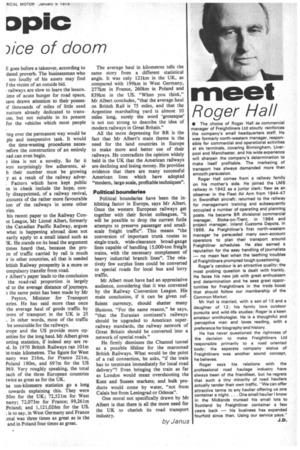opic
Page 41

If you've noticed an error in this article please click here to report it so we can fix it.
)1ce of doom
E goes before a takeover, according to dated proverb. The businessman who too loudly of his assets may find f the victim of an outside bid.
railways are slow to learn the lesson. .ime of acute hunger for road space, lave drawn attention to their possesA' thousands of miles of little used ructure already dedicated to transIse, but not suitable in its present for the vehicles which most people
ing over the permanent way would be pie and inexpensive task. It would the time-wasting procedures neces)efore the construction of an entirely 3ad can even begin.
idea is not a novelty. So far it von surprisingly few adherents, alh their number must be growing y as a result of the railway adver. Factors which have kept public m in check include the hope, conly disappointed, of a railway revival, .ccounts of the rather more favourable ion of the railways in some other ries.
his recent paper to the Railway Con n League, Mr Lionel Albert, formerly the Canadian Pacific Railway, argues what is happening abroad does not sarily apply to a small island such as K. He stands on its head the argument times heard that, because the prom of traffic carried by rail is much r in other countries, all that is needed fritish Railway prosperity is a more or ompulsory transfer from road.
r Albert's paper leads to the conclusion the road-rail proportion is largely to the average distance of journeys. the same point has been made by Mr Peyton, Minister for Transport 3tries. He has said more than once the average haul of goods traffic by )rms of transport in the UK is 25 . In other words, most of the traffic be unsuitable for the railways.
'rope and the US provide more opmities for the long haul. Mr Albert gives orting statistics, if indeed any are re d. 1970 British Railways ran 101m tit-train kilometres. The figure for West nany was 216m, for France 221m, Poland 180m, and 697m for the US 969. Very roughly speaking, the total !.ach of the three European countries twice as great as for the UK.
Lie ton-kilometre statistics go a long towards explaining this. They were 50m for the UK; 72,521m for West nany; 72,073m for France; 99,261m Poland; and 1,121,026m for the US. . is to say, in West Germany and France :otal was three times as great as in the and in Poland four times as great. The average haul in kilometres tells the same story from a different statistical angle. It was only 121km in the UK, as compared with 199km in West Germany, 277km in France, 260km in Poland and 839km in the US. "When you think," Mr Albert concludes, "that the average haul on British Rail is 75 miles, and that the Argentine marshalling yard is almost 10 miles long, surely the word 'grotesque' is not too strong to describe the idea of modern railways in Great Britain."
All the more depressing for BR is the fact that Mr Albert's main theme is the need for the land countries in Europe to make more and better use of their railways. He contradicts the opinion widely held in the UK that the American railways are declining and losing money. He provides evidence that there are many successful American lines which have adopted "modern, large-scale, profitable techniques".
Political boundaries Political boundaries have been the inhibiting factor in Europe, says Mr Albert. Once the western European railways get together with their Soviet colleagues, "it will be possible to drop the current futile attempts to preserve passenger and smallscale freight traffic". This means "the conversion of important trunk routes to single-track, wide-clearance broad-gauge lines capable of handling 15,000-ton freight trains, with the necessary complement of heavy industrial branch lines". The relatively few surplus lines could be converted to special roads for local bus and lorry traffic.
Mr Albert must have had an appreciative audience, considering that it was convened by the Railway Conversion League. His main conclusion, if it can be given sufficient currency, should shatter many illusions. "For the same reason," he says, "that the Eurasian continent's railways should be upgraded to American superrailway standards, the railway network of Great Britain should be converted into a network of special roads."
He firmly dismisses the Channel tunnel as a possible lifeline for the marooned British Railways. What would be the point of a rail connection, he asks, "if the train has to terminate immediately for local road delivery"? Even bringing the train as far as London would mean overshooting the Kent and Sussex markets; and bulk products would come by water, "not from Calais but from Leningrad or Odessa".
One moral not specifically drawn by Mr Albert is that there is all the more need for the UK to cherish its road transport industry.
by Janus




























































































